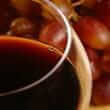Background
- Resveratrol is found in over 70 plant species including nuts, grapes, pine trees, certain vines, and red wine. Some experts believe that resveratrol may be a factor in the French paradox that coronary heart disease mortality in France is lower than other similar industrialized countries due to the frequent consumption of red wine.
- Resveratrol has been shown in animal and laboratory studies to exhibit antioxidant, anticancer, antiproliferative, antifungal, antiviral, and antibacterial effects. However, data in humans is lacking.
- At this time, there is a lack of high quality human trials available supporting the efficacy of resveratrol for any indication. However, there are several observational studies that correlate the consumption of wine with a decrease in cancer and/or cardiovascular disease risk. There are multiple possible contributing factors to these conditions, and studies of resveratrol are difficult to design and implement. Too much alcohol intake can be dangerous. Further research is needed before a firm recommendation can be made.
References
- Aggarwal BB, Shishodia S. Molecular targets of dietary agents for prevention and therapy of cancer. Biochem Pharmacol 2006 May 14;71(10):1397-421.
View Abstract - Baur JA, Sinclair DA. Therapeutic potential of resveratrol: the in vivo evidence. Nat Rev Drug Discov 2006 Jun;5(6):493-506.
View Abstract - Cheong H, Ryu SY, Kim KM. Anti-allergic action of resveratrol and related hydroxystilbenes. Planta Med 1999;65(3):266-268.
View Abstract - Cruz MN, Luksha L, Logman H, et al. Acute responses to phytoestrogens in small arteries from men with coronary heart disease. Am J Physiol Heart Circ Physiol 2006 May;290(5):H1969-75.
View Abstract - Delmas D, Lancon A, Colin D, et al. Resveratrol as a chemopreventive agent: a promising molecule for fighting cancer. Curr Drug Targets 2006 Apr;7(4):423-42.
View Abstract - Gronbaek M, Deis A, Sorensen TI, et al. Mortality associated with moderate intakes of wine, beer, or spirits. BMJ 5-6-1995;310(6988):1165-1169.
View Abstract - Labinskyy N, Csiszar A, Veress G, et al. Vascular dysfunction in aging: potential effects of resveratrol, an anti-inflammatory phytoestrogen. Curr Med Chem 2006;13(9):989-96.
View Abstract - Lekakis J, Rallidis LS, Andreadou I, et al. Polyphenolic compounds from red grapes acutely improve endothelial function in patients with coronary heart disease. Eur J Cardiovasc Prev Rehabil 2005 Dec;12(6):596-600.
View Abstract - Levi F, Pasche C, Lucchini F, et al. Resveratrol and breast cancer risk. Eur.J Cancer Prev 2005;14(2):139-142.
View Abstract - Rainsford KD. Influenza ("Bird Flu"), inflammation and anti-inflammatory/analgesic drugs. Inflammopharmacology 2006 Mar;14(1-2):2-9.
View Abstract - Rahman I, Kilty I. Antioxidant therapeutic targets in COPD. Curr Drug Targets 2006 Jun;7(6):707-20.
View Abstract - Rakici O, Kiziltepe U, Coskun B, et al. Effects of resveratrol on vascular tone and endothelial function of human saphenous vein and internal mammary artery. Int J Cardiol 2005 Nov 2;105(2):209-15.
View Abstract - Truelsen T, Gronbaek M, Schnohr P, et al. Intake of beer, wine, and spirits and risk of stroke: the Copenhagen city heart study. Stroke 1998;29(12):2467-2472.
View Abstract - Zern TL, Wood RJ, Greene C, et al. Grape polyphenols exert a cardioprotective effect in pre- and postmenopausal women by lowering plasma lipids and reducing oxidative stress. J Nutr 2005;135(8):1911-1917.
View Abstract







